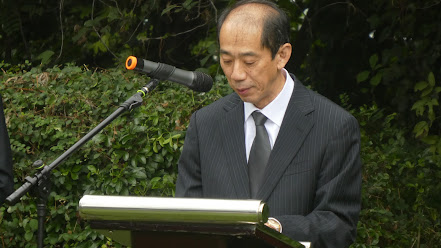The annual commemoration for the victims of the Hiroshima atomic bomb took place on Saturday, 6th August 2022, the 77th anniversary of the bombing, at the memorial cherry tree in Merrion Square park, Dublin 2.
Opening the ceremony, Deputy Lord Mayor of Dublin Darcy Lonergan spoke of the need for hope in the face of a world once again threatened by the possibility of nuclear war. She praised the work of Irish diplomats over the years for their key role in bringing both the Non-Proliferation Treaty and, more recently, the treaty on the Prohibition of Nuclear Weapons to reality.
Mr Mitsuru Kitano, the Japanese Ambassador to Ireland, noted that the current prime minister of Japan comes from Hiroshima, and cited Prime Minister Kishida's recent reiteration, at the Non-Proliferation Treaty review conference at the United Nations, of Japan's commitment to working for a world without nuclear weapons.
 |
| The Japanese ambassador to Ireland, Mr Mitsuru Kitano, addressing the annual Hiroshima commemoration in Merrion Square. |
The President of Irish CND, Canon Patrick Comerford, was unable to attend, and Irish CND chairperson, Dr David Hutchinson Edgar, read out a short reflection by Canon Comerford in his absence.
Traditional musician Máire Ní Bheaglaíoch contributed several pieces of reflective music on the accordion, and poet Eriko Tsugawa read her poem, "Lull in the rain", the title poem from her collection which received the Hideo Oguma Japanese Poetry Award this year.
Irish CND Chairperson, Dr David Hutchinson Edgar, spoke of the importance of meeting the threat of nuclear weapons and the reality of violence in the world today with a strong voice for peace and hope, quoting the closing words of the Vienna Declaration, agreed at the first Meeting of States Parties to the Treaty on the Prohibition of Nuclear Weapons in June 2022:
"We have no illusions about the challenges and obstacles that lie before us in realizing the aims of this Treaty. But we move ahead with optimism and resolve. In the face of the catastrophic risks posed by nuclear weapons and in the interest of the very survival of humanity, we cannot do otherwise. We will take every path that is open to us, and work persistently to open those that are still closed. We will not rest until the last state has joined the Treaty, the last warhead has been dismantled and destroyed and nuclear weapons have been totally eliminated from the Earth."
At the close of the ceremony, the Deputy Lord Mayor laid a wreath at the base of the cherry tree, followed by the observation of a minute's silence in memory of all victims of atomic and nuclear bombing and testing.

